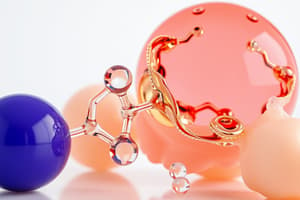Podcast
Questions and Answers
What property of liquids is influenced by the intermolecular forces of attraction?
What property of liquids is influenced by the intermolecular forces of attraction?
- Density
- Volume
- Boiling point (correct)
- Color
What property of liquids refers to the resistance of a liquid to flow?
What property of liquids refers to the resistance of a liquid to flow?
- Surface tension
- Heat vaporization
- Density
- Viscosity (correct)
Which property of liquids is attributed to the strong cohesive forces between molecules, particularly at the surface of the liquid?
Which property of liquids is attributed to the strong cohesive forces between molecules, particularly at the surface of the liquid?
- Boiling point
- Vapor pressure
- Surface tension (correct)
- Heat vaporization
What does surface tension refer to in liquids?
What does surface tension refer to in liquids?
What type of force causes spherical water droplets on leaves?
What type of force causes spherical water droplets on leaves?
What is the property of a liquid that allows it to hold a heavier paper clip on its surface?
What is the property of a liquid that allows it to hold a heavier paper clip on its surface?
What is the term used to describe the 'thickness or thinness' of a liquid?
What is the term used to describe the 'thickness or thinness' of a liquid?
Which factor determines the viscosity of a substance?
Which factor determines the viscosity of a substance?
What happens to the viscosity as the temperature increases?
What happens to the viscosity as the temperature increases?
What is the boiling point of a liquid influenced by?
What is the boiling point of a liquid influenced by?
Which type of molecules have higher boiling points?
Which type of molecules have higher boiling points?
What is vapor pressure?
What is vapor pressure?
How do substances with strong intermolecular forces affect vapor pressure?
How do substances with strong intermolecular forces affect vapor pressure?
What factor determines the amount of heat required to vaporize one mole of a substance at its boiling point?
What factor determines the amount of heat required to vaporize one mole of a substance at its boiling point?
What type of solids are formed rapidly and do not have well-organized crystalline structures?
What type of solids are formed rapidly and do not have well-organized crystalline structures?
What are glasses an example of?
What are glasses an example of?
Flashcards are hidden until you start studying
Study Notes
Properties of Liquids
- Intermolecular forces of attraction influence properties such as viscosity and boiling point.
- Viscosity refers to the resistance of a liquid to flow; higher viscosity means thicker liquids.
- Strong cohesive forces between liquid molecules result in surface tension, particularly noticeable at the liquid's surface.
Surface Tension and Cohesive Forces
- Surface tension is the tendency of a liquid surface to shrink and resist external force, creating a "film" effect.
- Spherical droplets of water on leaves are a result of surface tension acting due to cohesive forces.
Liquid Properties and Behaviors
- A liquid can support a heavier object, like a paper clip, on its surface thanks to surface tension.
- The term 'viscosity' describes the "thickness or thinness" of a liquid, indicating its flow properties.
Influences on Viscosity and Temperature
- Viscosity decreases as temperature increases because increased thermal energy allows molecules to move more freely.
- The boiling point of a liquid is influenced by its intermolecular forces; stronger forces result in higher boiling points.
Molecular Properties
- Larger or heavier molecules typically exhibit higher boiling points due to greater intermolecular forces.
- Vapor pressure is the pressure exerted by vapor molecules above a liquid in a closed container.
Intermolecular Forces and Vapor Pressure
- Substances with strong intermolecular forces generally have lower vapor pressures because fewer molecules escape into the vapor phase.
- The amount of heat required to vaporize one mole of a substance at its boiling point is determined by the enthalpy of vaporization.
Types of Solids
- Amorphous solids form rapidly and lack organized crystalline structures, distinguishing them from crystalline solids.
- Glasses are a common example of amorphous solids, characterized by their lack of long-range order.
Studying That Suits You
Use AI to generate personalized quizzes and flashcards to suit your learning preferences.




